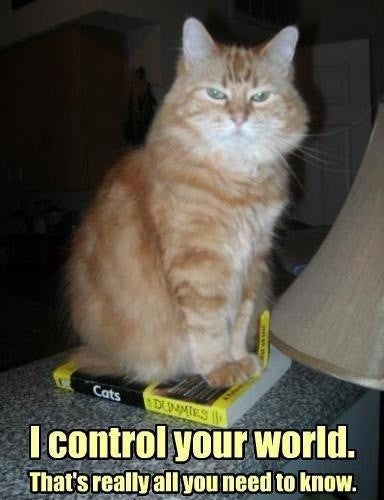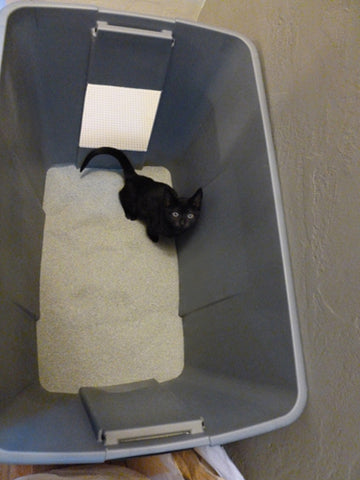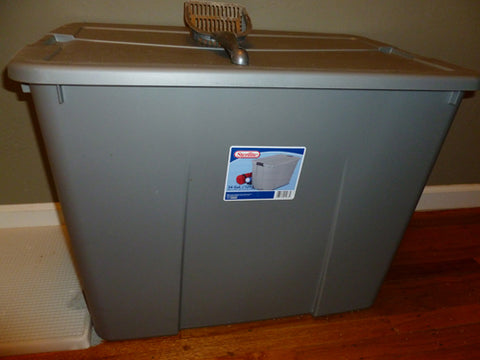What Type Of Litter Box Should Be Used?

We often get asked what type of litter box should be used. There are so many types of litter boxes that we understand how this could be a confusing choice. Among the choices are the fully automated Litter Robot and the automatic scooping electric litter boxes, the kind that is rolled over to sift out clumps, the covered or hooded litter box, the dome litter box, the hidden litter box, modern fashionable litter boxes like the Modkat, and of course the small, medium, large, and jumbo regular ol' plastic litter boxes. Whew!
So, does it matter which you use? In short, yes.
First, let's take a look at the litter box from your cats perspective - let's remove your human preferences from the equation. The litter box is primarily for your cat to do her business right? So just for the moment, let's not worry about if you have to scoop manually, or what your litterbox might look like in your house, or where you might fit it in your small apartment.
- First and foremost, size should be taken into account. The litter box is a stand-in for where your kitty would do her business if she were in the great outdoors. Cats like to scratch, dig, turn around, and get comfortable when doing their business. So first, choose a litter box that your cat can easily turn around in, and that she can easily get in and out of. Kittens should also have appropriately sized litter boxes (and multiple litter boxes...more on that in another article). You also don't want your cat to have to step in her own waste - your cat may choose to not use the litter box if this happens (which is understandable).
- Covered or not covered? Let's face it - none of us likes strong odors, especially unpleasant ones. Now imagine yourself with a smell sense 14 times stronger than the one you currently possess, and you will understand why this issue is even more important for your cat (don't make your cat regret her super-hero-like sense of smell). Covered litter boxes should not be used for this reason. They trap odors, and will be unpleasant for your cat (this is also a reason why truly unscented cat litter should always be used. Read more on the feline sense of smell - http://bit.ly/P7ygRf). Additionally, if a covered litterbox is too small, your cat may feel claustrophobic or trapeed inside the box and avoid it. Finally, those who have a covered or hooded litter boxes tend to not see the waste that need to be scooped, and thus clean it less, which is unpleasant for your cat, and unpleasant for you when your cat decides not to use the box. These negatives certainly point towards using an uncovered litter box.
After taking the feline perspective into account with these two facts, the choices of which litter box to use is narrowed considerably, and your preferences begin to come into the equation.
The human preference that we hear about most is disliking scooping. Some people don't mind it, and some people do. If you are using or considering using an electric litter box that will do the job of scooping for you, there is no problem with it if your cat doesn't mind. In some cases, it can keep the litter box cleaner than you would be able to do yourself. However, as always, it's important to keep in mind the connection to nature that the litter box provides your indoor cats. In nature there are no electric sensors that will rake the ground clean when a cat steps away;) If you are using an automatic litter box, it's important to keep a close eye on your cats reactions to the box, and to quickly change to a manual litter box if your cat seems uncomfortable, skittish or stops using the box.
From our point of view, the best litter box is the kind that doesn't have the bells and whistles - the jumbo plastic box that is scooped manually twice a day. It provides a lot of space for your cat to move around in, and provides the most direct connection with nature. It's the right tool for the job from your cats perspective, and although it takes the work of cleaning it, it has the best chance of keeping your cat anxiety free and using the litter box (that original and most important task of the litter box).
We also suggest a high lip on the litter box you choose, with at least one lowered side so your cat can easily step in and out of the box (many basic plastic litter boxes have a lip attachment that will perform this function, as well as keep a litter liner firmly in place). This will allow easy entry and exit for your cat, while keeping the litter inside the box while your cat scratches around. Whichever litter box you choose, a little litter may escape from the box while your cat scratches around, or when your cat steps from the box - this is normal, and just as it works in nature.
---
7/30/12
We received a wonderful comment to this article from Dr. Lisa Franck D.V.M. and thought it would be useful to include:
"Great article! I have litter boxes made from storage totes. I buy 30 to 40 gallon storage totes (Sterilite brand is an example), and cut a square entrance in the plastic as an entrance. When looking for one, just make sure you find one that doesn't have a ton of grooves on the bottom... My cats love these, and I have had no potty problems since adopting this method. As well, I have a cat that stands to pee, and even with the covered boxes, urine would leak through the cracks. Many of my clients that come to me with inappropriate urination/defecation problems have also found happy kitties with this."
-Dr. Lisa Franck D.V.M.
Thanks to Dr. Franck for sending us these pictures of her great DIY litter box setup (filled with Boxiecat litter!):



---
Stay tuned for upcoming articles on how many litter boxes to use, litter liners, and where to place the litter box. Sign up to our newsletter to receive our emails with articles, cat care tips, and more.
---
As always we look to ways of keeping cats comfortable, happy, and using the litter box. Following these and other basic rules of litter box care can help avoid problems from coming up if your cat uses the box well, and help to alleviate problems if your cat already has litter box issues. Please note that some litter box behaviors and avoidance can be a sign of medical problems - if your cat has litter box issues or you notice changes in litter box behavior, it is important to take your cat to a good veterinarian. Although Boxiecat brand litter is veterinarian recommended, the writers of the article wish to state that we are not qualified to give medical advice.

- Tags: Litter Boxes

